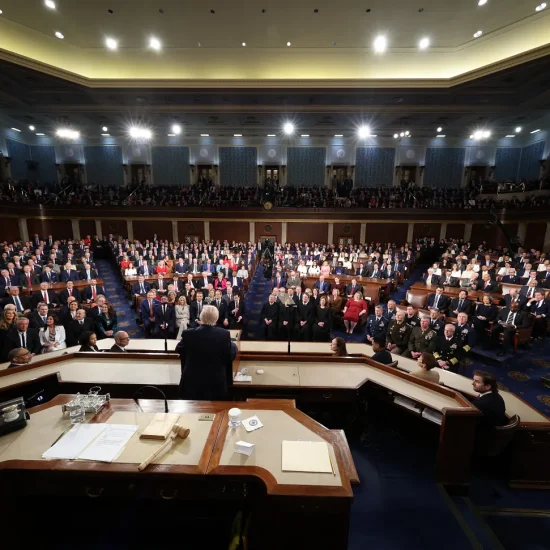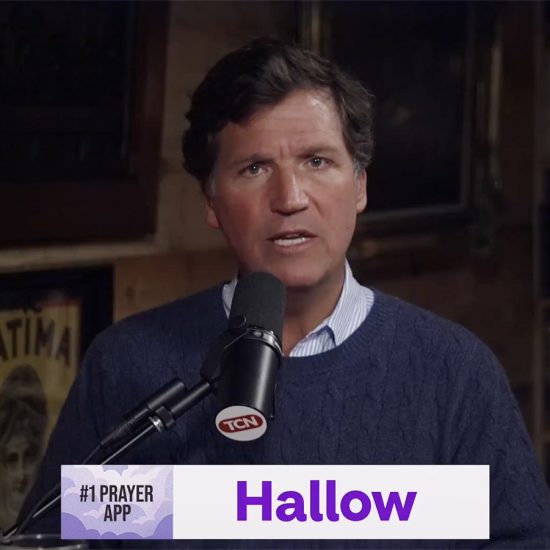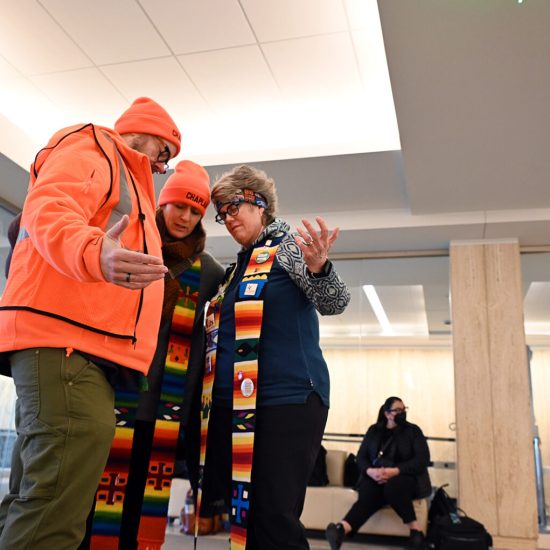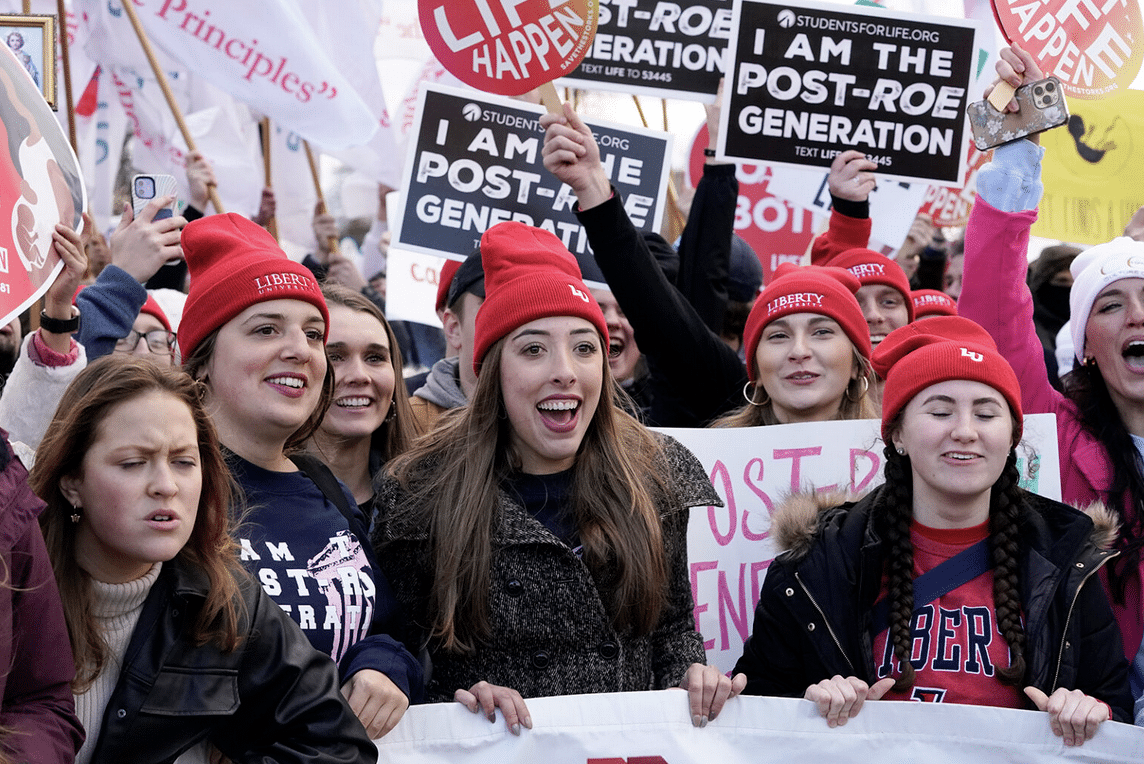
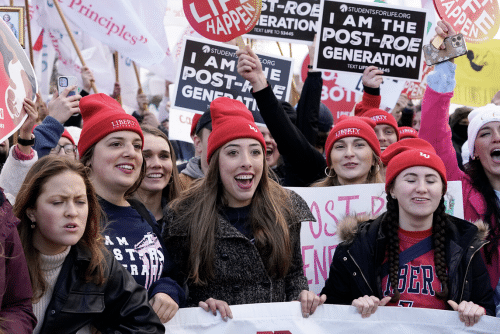
Anti-abortion demonstrators march toward the U.S. Supreme Court during the March for Life, Friday, Jan. 20, 2023, in Washington. (AP Photo/Alex Brandon)
WASHINGTON (RNS) — Thousands assembled on Friday (Jan. 20) to participate in this year’s edition of the anti-abortion March for Life on the National Mall, where throngs celebrated the fall of Roe v. Wade while expressing trepidation as the abortion debate moves to the states.
Jeanne Mancini, president of the March for Life, opened up the 50th iteration of the rally by noting it was the “first march in post-Roe America,” prompting cheers from the crowd. But she was quick to dispel any notion that the anti-abortion movement has slowed following the Supreme Court’s decision to end nearly five decades of nationwide abortion access.
“We will march until abortion is unthinkable,” Mancini said, sparking another roar of approval from attendees.
The event, which appeared roughly the same size as past versions, was framed as something of a pivot point for the broader anti-abortion movement. It was present in the day’s theme — “Next Steps: Marching into a Post-Roe America” — and Mancini made a point of promoting smaller versions of the march scheduled to take place in certain states later this year.
“Boy, did we get a huge victory just a few months ago when Roe was overturned,” said Republican Majority Leader Rep. Steve Scalise of Louisiana, one of several lawmakers to address the demonstration. “But as you all know, that’s only the end of the first phase of this battle. The next phase now begins.”
The sentiment was similar in the crowd, where faith was a constant as in years past. Bryson Nesbitt, from North Carolina, explained the need for further action while holding a large Christian flag.
“I believe God will bless the nation for making that change,” he said, referring to the overturning of Roe, “but I think there’s more work that needs to be done.”
Precise definitions of the movement’s new phase were hard to find at the demonstration, however. Not that there weren’t suggestions: March for Life organizers urged supporters to lobby Congress on legislation such as the “No Taxpayer Funding for Abortion Act,” and the march route was symbolically changed to funnel participants past the western face of the Capitol instead of near the Supreme Court, as in years past.
Yet the legislation, which would make permanent the restrictions on federal funding for abortion, is unlikely to pass a Democratically controlled U.S. Senate, and much of the ongoing debate over abortion is happening at the state level — not in Congress.
The shift wasn’t lost on the Rev. Dave Pivonka, the president of Franciscan University of Steubenville in Ohio, who stood near the back of the crowd. One of many Catholics in attendance, he said students from his school were not only present in Washington for the march, but also in Columbus, Ohio, where they were urging politicians to pass anti-abortion legislation.
“It’s really going to move more towards a local level,” he said.
“The thought was, ‘Let’s overturn Roe v. Wade.’ Well, that was great, but the goal is that more babies are saved. The goal is for an end of abortion.”
Many march participants were realistic about the obstacles their movement still faces. Despite the festive mood at the rally, public opinion polls continue to show widespread support for making abortion legal in all or most cases, and the 2022 midterm elections resulted in a slew of victories for abortion rights advocates.
Pushback to the anti-abortion movement is growing louder among people of faith as well, with liberal-leaning activists often stressing that support for sweeping abortion restrictions is a minority position in many religious traditions — including among Catholics. The day before the march, advocates affiliated with the group Catholics for Choice surprised anti-abortion activists protesting in front of a Washington Planned Parenthood by unfurling banners behind them that read “Most people of faith support legal abortion.” Catholics for Choice also put up posters along the March for Life’s route emblazoned with similar messages.
Religious groups have filed lawsuits in several states challenging new abortion bans as well, with many arguing the prohibitions conflict with their own faiths.
There was little mention of such religious opponents at the March for Life, although one demonstrator held a sign that read “Excommunicate Pro-Choice Catholics.”
Two sisters and longtime attenders of the march — Sara Sullivan and Megan Kinsella, both Catholic and from Virginia — characterized the event as an unusually boisterous affair. The pair grew up attending the March for Life, and their children, now in high school, were somewhere in the crowd.
“I’ve been (to) a lot,” Sullivan said. “This is definitely a more cheerful, lighthearted feel — like a celebration.”
But even as they celebrated, Sullivan and Kinsella eventually circled back to the message of the day: steeling themselves for clashes over abortion that will be waged far from Washington’s halls of power.
“The follow-up story is going to be to go into the state,” Kinsella said, pointing out that one of the March for Life’s state-level events is scheduled to take place in Richmond next month.
“That’s where we have to concentrate our efforts, because it’s not over — it’s just going back to the states.”

